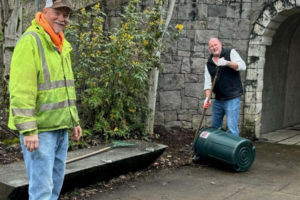Spring cleaning can provide motivation to reduce the amount of stuff that is taking up space.
LaRhea Steele, of Camas, recently cleaned out linen and clothes closets.
She donated some full size sheets to Arc of Southwest Washington, and clothing that is no longer being worn will go to a church rummage sale.
She will keep sentimental items, such as her daughter’s first Communion dress from 1979.
“It had a large orange stain on the skirt and underskirt,” Steele said. “When I took it to our local cleaners, she did not think it would come out but she would try. It now looks brand new.”
Steele, 73, and her husband, Jerry, raised their five children in the home they moved into 42 years ago.
“Furniture has been moved to different rooms, as our needs changed,” she said. “That helps the de-cluttering.




